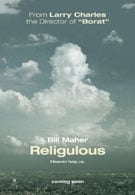Early on in Religulous, Bill Maher throws up a bar chart illustrating the number of people in America who are non-religious. That number is 16%, more than blacks, more than Jews, more than numerous other minority groups who seem to have no problem making themselves heard and getting Congress to do their bidding. Maher wonders aloud why non-religious people are so underground, and why they aren’t having an impact on the national discussion. His film is aimed squarely at that 16% of the country, and almost no one else. His goal, and he clearly has one, is to give those people the motivation they need to come out of the closet and do something… before it’s too late.
Religulous begins with Bill Maher, standing alone in Israel at a place called Meggido; a worthless pile of rubble where many of the planet’s religions believe the end of the world will begin. From there, Maher pushes us into an intense, honest, and brutally funny discussion of blind belief, presenting the possibility that maybe we should all consider doubt instead. We follow him around the world, as he travels from place to place talking to religious people of different faiths on different continents. The surprising thing here is that even though Maher definitely has an agenda, his movie never skews into the realm of propaganda.
It’s not propaganda, because Maher isn’t running out and finding weirdos to use in smear tactics against the devout. Typically anyone trying to make a case against God goes right to the pedophile priests and the suicide bombers, but Maher makes it a point to focus on normal, reasonably sane religious people. He’s not stacking the deck in his favor, because he doesn’t need to. He talks to truckers in a roadside chapel, he chats with random, middle-class tourists at a Christian-themed amusement park. He talks to religious shop owners, small town preachers, televanglists, Jews for Jesus, fundamentalist U.S. Senators, Vatican priests, religious scientists, secular Muslims, gay Muslims, people in America, Utah (come on, we all know it’s not really America), Europe, and even in Jerusalem. Though those fumbling for an excuse to discredit him may claim otherwise, these aren’t extremists or lunatics. These are for the most part sane, rational, even intelligent people who believe something which Maher believes is insane.
Maher lets these people talk, but he doesn’t let them get away with fooling anyone, including themselves. He asks about their beliefs, and then refuses to follow the cultural taboos which demand he let it go when they say something ridiculous. He talks to them plainly and without fear, asking the tough questions for which religion, any kind of religion, seems to have no answer. Some of them get angry, most of them simply, and politely, shut down; their brains refusing to go any further when he brings up a point of view which might cause them to objectively consider their blind faith. Others, unable to cope with his queries, admit to being genuinely stupid, as did an Arkansas Senator who awkwardly excuses his flawed thinking by admitting that his job as an elected official doesn’t require an IQ test.
Maher doesn’t ambush any of these people, and I think that’s the key to why Religulous works. This isn’t a setup. He asks intelligent, well considered, extremely direct questions of the people he encounters, with each question leading to another, forming a discussion which while often extremely funny, is also almost scientific in its method. He’s not out to trap people or make anyone look like a fool, though if they do it on their own he’s not going to turn away. Sarcastic subtitles occasionally appear to turn up the funny, but it never becomes snide or condescending. Maher himself admits to a past in which he had religious leanings, and when he gets a reasonable answer to one of his queries, he’s willing to admit his own admiration and surprise. The smartest answers come, unbelievably, from a guy who makes his living playing Jesus dress-up. The movie frames itself from the outset as a quest for knowledge, and believe it or not, in large part that’s what it is.
To keep things rolling, director Larry Charles uses old stock footage between the moments of Maher’s encounters. It’s not meant as mockery, merely comic relief. I’m not sure Religulous needed it, Maher’s discussions alone will have you rolling in the aisles. But those random little asides provide breaks in the movie’s intensity, a moment to pause and consider, through the laughter, the truth of whatever it is you’ve just seen. Those inserts aren’t manipulative though, merely silly and Charles seems otherwise to go out of his way to give his movie a strange kind of transparency. The movie’s edited, yes, but Charles doesn’t shy away from showing us the scene around their setup. The camera crew shows up more than once on screen, and Larry Charles himself is occasionally heard, as if to remind us that he’s there, and he’s not trying to hide anything.
Religulous seems to know however, that no matter how genuine or factual or well thought out it is, it’ll never get through to anyone outside of that 16% referenced at the outset. So it isn’t trying. Bill Maher is not out to change anyone’s mind, just remind the ones who already know of how dangerously ridiculous this whole thing is. For most of the movie’s running time he lets the game come to him, delivering comedy and poignancy with an unwavering, steady style.
Your Daily Blend of Entertainment News
It’s only in the film’s big finish that Religulous steps back to where it all started at Meggido, and really gets serious. There, standing on that heap of religious rubble, Bill asks his audience to remember what they’ve seen, to look at the world around them, and realize where it’s all taking us. He calls on those skeptics in the 16% to stand up and be counted, to make their voice heard, before it’s too late for the human race. With an agenda like that, Religulous will likely cause a mental meltdown for anyone with a religious bent. But for the people Bill Maher is trying to reach, his message comes in loud and clear. If you’re in that 16%, you’ll be rocked right out of your seat, either from laughter or sheer incredulity. If Maher has his way, non-believers will see his film, stand up, be counted, and come out of hiding to say “I don’t know… and neither do you.”


